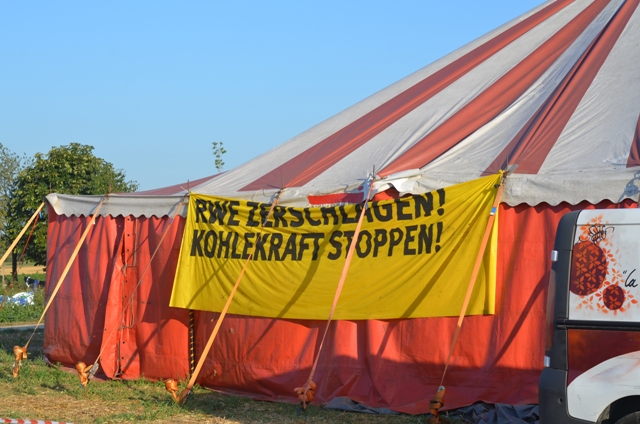Middle-Europe's prosperity as well as our high levels of mobility and consumption are based on three industrial revolutions whose technical progress has constantly been increasing labour productivity. The consequences are paradoxical: On one hand it is possible to produce ever more goods with the same amount of work. On the other hand these productivity increases are being used to make human labour redundant and substitute it with machines.
If this is not to lead to mass unemployment but to rising prosperity for all, the current system requires economic growth, and the more our technological progress pushes productivity, the higher the growth-rates must be.
Now we are at the edge of a fourth industrial revolution. It will lead to the digitalization of many service-sectors too and might exceed any rationalization effects that had seemed possible up to now. With this, the most innovative societies – precisely those who are already drowning in consumption – become exposed to an unprecedented growth-pressure if they are to avert a socio-political disaster.
Fatally, this growth-strategy is increasingly reaching its limits. Its ecological costs are on the rise and despite all efforts to decouple life in the comfort-zone from environmental damages, the overall living standard in the Northern hemisphere becomes more and more irresponsible. At the moment, Germany is a good example: With an "Energiewende" that reduces almost no CO2 emissions but destroys landscapes instead, not only a megalomaniac technology-project has failed, but also the long-desired proof that continuous economic growth and a clean ecological conscience are compatible.
Besides climate change, further barriers to growth, also cultural ones, come in sight. Digital communication systems as well as the exuberant mobility of people and products infiltrate each and every corner of the globe. But where everything is connected with everything through streams of people, goods and data, it is inevitable that everything also competes with everything. What's more, the differences unleashed here are not restricted to the economic dimension, but evoke a latent comparison of modernization levels that constantly confronts its losers with their inability to keep up – at least when measured with the European and Northern-American ideal.
The more permissive and self-centered the offspring of the consumption and technology-oriented cultures behave, the more superior they can feel and the more humiliated those left behind remain. Cultures oriented towards traditional or even religious standards lose any protection against exposure to their shortfall in modernization.
This cultural comparison pulverizes stable orientations, and nobody in Africa, Asia or Latin America can escape it thanks to cheap smart phones and flights. What once was meaningful and materially sufficient becomes now devalued and merely feels pre-modern, miserable or even inhumane. The expectations towards progress's promises are high, but the prospects of fulfilling them are highly deficient. The gap between both shatters cultures and social contexts.
Two typical reaction-patterns of the dishonoured keep Europe in suspense. On one hand religious traditions are radicalized. Separating oneself from the "unholy" modernizers and fighting them as enemies seems to strengthen identities, because it helps to build a heroic sense of self-esteem. On the other hand more and more people leave their homes to reach the assumed paradise of Europe. They follow the promise to seamlessly imitate the life of the progressive people there. Add to this those who flee from wars. The most clever migrate and the Southern economies bleed to death. This way, what was to be built in decades of development politics is destroyed.
Global justice, however, can neither be a project of cultural homogenization, nor can it be reached on the economic level alone. It is not the South that has to be "developed", but the North that has to be materially disarmed. Only that way it can give dignity back to the South without evoking unrealizable dreams. A mere transfer of the European way of life – be it through international trade, development politics or migration – can only end in an ecological disaster.
A development model for Europe could only be consistent with global justice if it decreased the difference in prosperity by reducing its own material claim to a "human scale". This concept, coined by Leopold Kohr and Ernst Friedrich Schumacher means more than mere self-restriction in order to stay within ecological limits. It gives the prospect of overcoming growth-pressure - but only if we are able to eventually de-globalize and de-industrialize our life.
Europe would turn into a continent of sovereign regions with supplies that are produced as locally as possible. People would become more settled which – admittedly - would require a more modest level of prosperity. In turn it would be more resilient to crises as well as ecologically responsible.
In place of the unbounded industrial labour-division we could have modern production systems on a smaller scale, combined with craft and urban subsistence. This would mean overcoming the current dogma of productivity by using simpler technologies. These would not substitute human labour but modestly reinforce it; they would get along with less capital and be controllable.
In order to cushion the unavoidable reduction in income and industrial production with social policy-measures, we would need to redistribute the remaining wage-labour. Full employment would still be possible, albeit on a much lower level of paid working hours; around 20 hours per week.
The liberated 20 hours could be used to refine the reduced production of goods through artisan subsistence. This way, people could partially self-produce particular goods, e.g. food and could go back to maintaining and repairing day-to-day tools themselves while using them collectively. Respectively, the demand for goods would decrease. People, who, in addition to a 20-hour-job, would pursue artisan and subsistent activities, would exercise a dignified life no longer based on decadent convenience, but on the ability to survive in an autonomous and cooperative manner.
Such a life- and supply-style would be part of a post growth economy and require reducing our claims towards material self-fulfillment. However, because of its low technical, financial and educational requirements, it would be easy to copy, thereby offering an honest perspective for the global South. Moreover, its frugal and settled character would hardly unfold the culture-destroying maelstrom the European dream-factory continues to produce. ---------------------------------------------
This essay originally appeared in the German weekly magazine Die Zeit. Translation: Christiane Kliemann

Introducing a series of proposals for a truly transformative GND The Green New Deal is on everyone’s lips and policy platforms. Liberal pundit Thomas Friedman coined the term in 2007, and Left parties in the UK called for a Green New Deal during the recession that followed the 2008 global financial crash. Last year, Congresswoman Alexandria Ocasio Cortez rebooted the idea in the United Sta...

Against the background of a looming ecological collapse and extreme socio-economic inequality, growth-critical scholars and activists debate various eco-social policies that can facilitate transitions towards genuinely environmentally sustainable and socially equitable societies. Such policies include work sharing, time-banks, job guarantees, complementary currencies and minimum income schemes....

For our Degrowth in Action - Climate Justice Summer School 2015 we are currently looking for contributors to our courses. The summer school will take place from 9 to 14 August 2015 in the lignite-mining region of the Rhineland in cooperation with the annual climate camp. The courses will be at the centre of the Summer School and run for 4 or 2 days, thus giving the opportunity to dive deeper in...